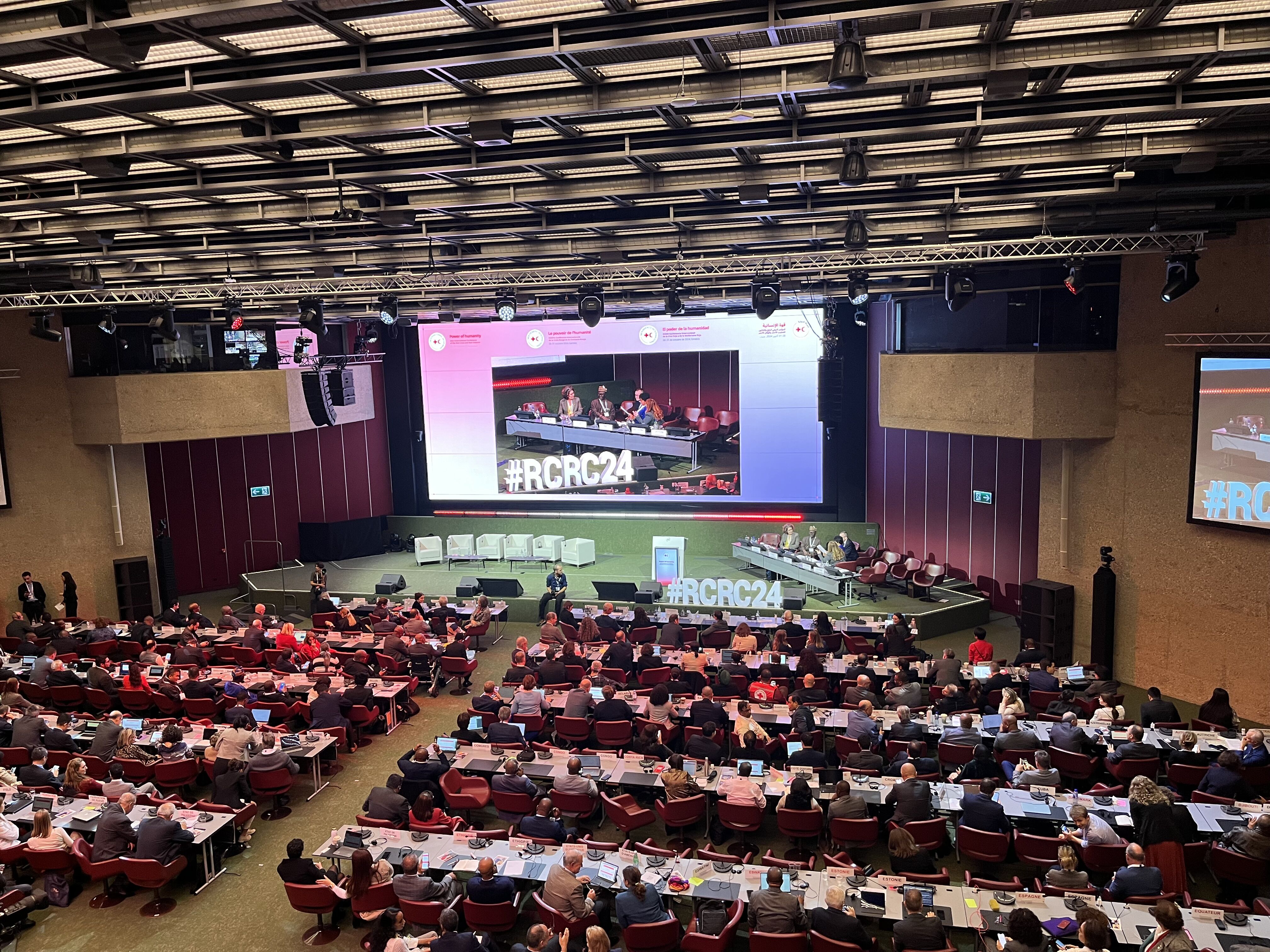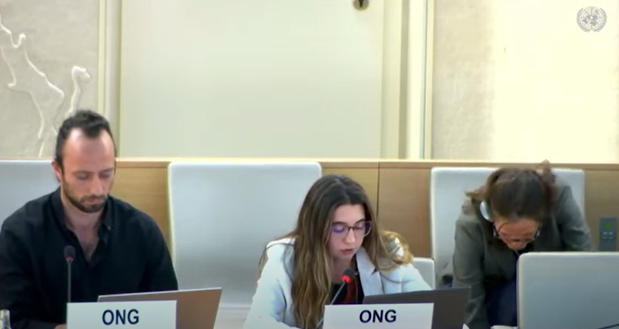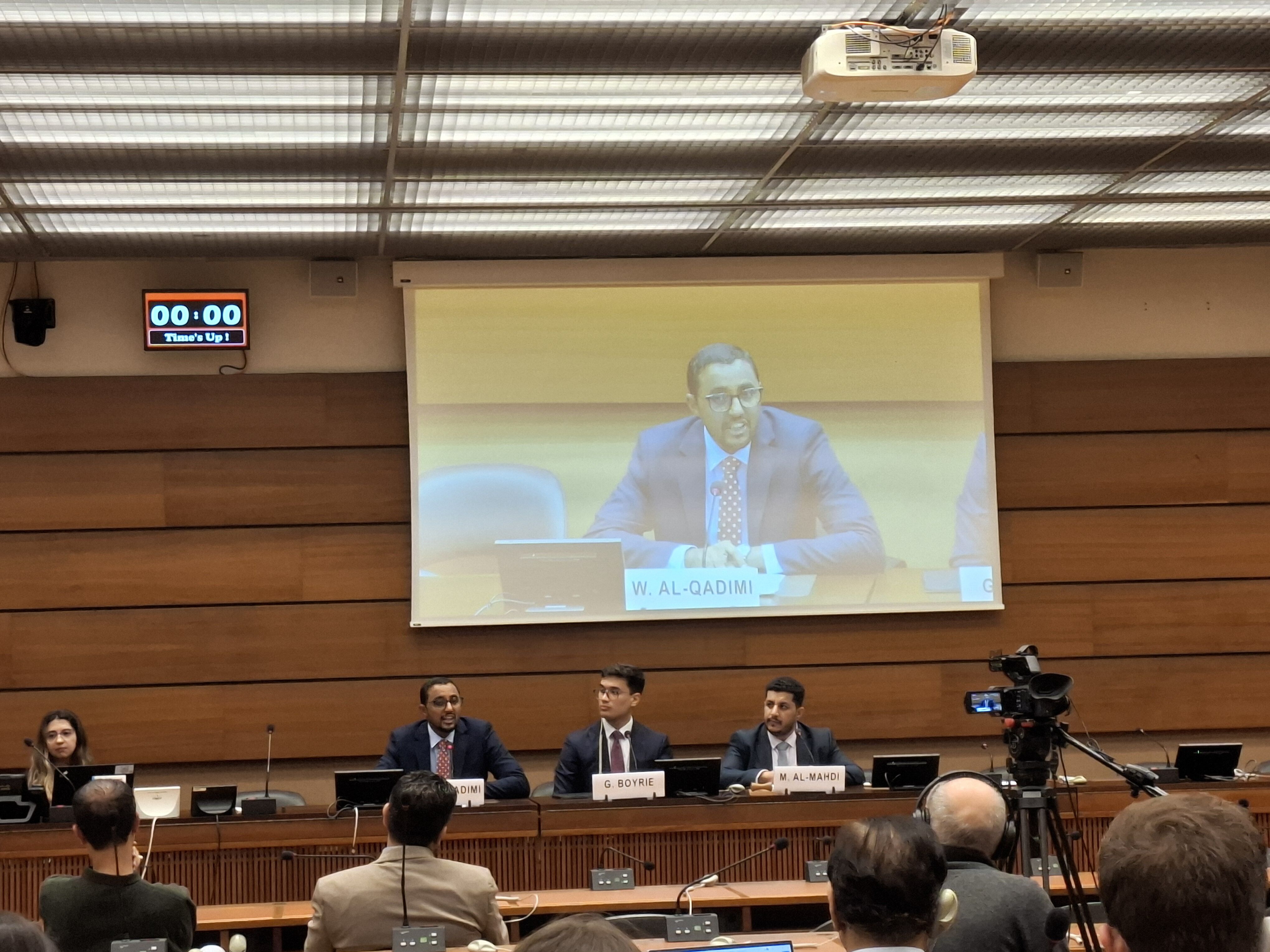15 June 2016
FALLUJAH: INSIDE THE GENOCIDE
A brief report on the dramatic human rights violations occurring inside and outside the city of Fallujah, Iraq

Abstract
This report intends sheding light on the crimes and human rights violations which took place in Fallujah, Iraq. In May 2016, the city was, in fact, subjected to a wide military campaign under the pretext of fighting ISIS. Such destructive campaign, under the name of “Liberate Fallujah”, has proved deleterious for the thousands of people trapped in the city. In addition, those who managed to escape the conflict and went seeking for help, have been arbitrarily detained by a various range of pro-government militia organizations. These innocent and unarmed civlians who fell in the hands of militias were deprived from water and food, and subjected to henious treatments, including verbal and psychological abuse, as well as disturbing practices of torture. Hundreds of them were then slaughtered and summarily executed in batches on the claims of allegedly belonging to ISIS.
This document also aims at proving that what occurred in Fallujah, and in general across Iraq, is part of systematic policy of sectarian violence, supported by the government, which has as ultimate objective that of ethnic cleansing- in particular of “Sunni” component of society.
Introduction
The city of Fallujah, located in the Al Anbar province of Iraq, witnessed an escalating level of violence following the launch of a destructive military offensive on the 22nd May 2016 by the Iraqi government. According to the authorities, the battle, in fact, allegedly aimed at “liberating Fallujah” from the so-called Islamic State of Iraq and Syria (ISIS). The campaign was carried out by the Iraqi army and affiliated militias, supported by U.S. air cover and Iranian military advisors on ground, who have provided weapons and arms to the al-Hashd al-Shaabi militia umbrella organization (Popular Mobilization Forces).
A few days after the military campaign started, Geneva International Centre for Justice (GICJ) sent several urgent appeals to the United Nations Secretary-General (24th May 2016), to the United Nations High Commissioner for Human Rights (24th May 2016, 7th June 2016 and 12th June 2016)1, to the Special Rapporteurs on: extrajudicial, summary or arbitrary executions, on torture and other cruel, inhuman or degrading treatment or punishment, on the promotion and protection of human rights while countering terrorism and to the Working Groups on Enforced or Involuntary Disappearances and on Arbitrary Detention (8th June 2016), as well as a letter to the President of the United States of America (27th May 2016)2, to express its deep concern towards both the growing number of civilian casualties resulted from the deadly attacks at the hands of the security forces as well as the American air forces, and the grave human rights violations taking place outside Fallujah at the hands of pro-government militias.
Indiscriminate shelling
 The military operation waged against Fallujah was carried out through the indiscriminate shelling of air missiles and other artillery over a wide range of buildings. On the first day of the attack, 22nd May 2016, GICJ sources on the ground reported the death of 11 members of one family. During the next day, Fallujah Teaching Hospital declared to have received the bodies of 10 victims (including five children and three women), as well as 25 wounded (including twelve children and eight women). On Tuesday 24th May 2016, 16 civilian deaths and more than 40 injured have been reported, mostly children and women once again.
The military operation waged against Fallujah was carried out through the indiscriminate shelling of air missiles and other artillery over a wide range of buildings. On the first day of the attack, 22nd May 2016, GICJ sources on the ground reported the death of 11 members of one family. During the next day, Fallujah Teaching Hospital declared to have received the bodies of 10 victims (including five children and three women), as well as 25 wounded (including twelve children and eight women). On Tuesday 24th May 2016, 16 civilian deaths and more than 40 injured have been reported, mostly children and women once again.
While the casualties among civilians were on the rise, the Fallujah Hospital has also been repeatedly bombed by aerial missiles on Wednesday 25th May 2016 and Thursday 26th May 2016, causing several damages to the building as well as the destruction of essential medical equipment. This has deeply undermined the possibility of injured or sick civilians to receive healthcare, as this was the only medical centre left in the city after the 2004 bombing carried out under the U.S. Bush administration.
These bombardments were most obviously affecting the many civilians still in the city. A precise estimate of the number of residents trapped in Fallujah at this moment was impossible to get. Iraqi authorities stated that there were about 50,000 civilians, whereas various local sources placed this number to approximately 196,000. Regardless of what information is correct, the number of people whose life was in extreme danger was dramatically high compared to the mere 500 Islamic Sate fighters that were claimed to be in the city.
Moreover, as it has been openly recognized by the US and Iraqi authorities, ISIS combatant were extremely dynamic targets and perfectly able to mix up with civilians. For such reasons, conducting a campaign of indiscriminate shelling and using such kind of weaponry could not have been less counterproductive.

Bombardments, as technologically accurate as they might be, are not suitable for such moving targets, especially since they used weapons with great destructive power as well. As a consequence, vast areas of the city were completely destroyed and many civilians got trapped under the rubble without any kind of rescue available.
Such actions are in clear contravention of the 1949 Geneva Conventions and, in particular, of the Fourth Convention relative to the Protection of Civilian Persons in Time of War.
War crimes and crimes against humanity
GICJ has received countless testimonies from Fallujah neighbourhoods and surrounding areas reporting the grave abuses committed by the militias involved in the conflict against those who manage to flee the fighting.
On the 27th May 2016, GICJ received documented proof that a militia organization called “Risaliyon”, under the command of the Iraqi parliament member Adnan Al Shahmani, slaughtered 17 civilians in the city of al-Karmah. The victims were part of the 73 men abducted after escaping ISIS and then detained and taken to the Rashad area, northeast of al-Karmah. The fate of this group is still unknown as of September 2016.
As of the 2ndto 5th June 2016, during the fighting in Saqlawiya, a small city, 20 km west of Fallujah, more than 1,000 civilians escaped the conflict to fall in the hands of al-Hashd al-Shaabi militias. Instead of being provided with support and assistance, these survivors have been detained on the claim of allegedly belonging to ISIS. The detainees were denied any access to food or water and subjected to torture and other degrading and inhuman treatment. According to the testimonies, the civilians had been conducted in a long row in a due place to be killed and the militiamen in charge of these executions, namely part of the Badr Organization and Katai’b Hezbollah, were wearing official police uniforms. Witnesses stated that militiamen were threatening and shouting against the captives, preannouncing them their imminent death. About 300 persons were reported to have died in the course of this ordeal.
 |
 |
Those who managed to be released, roughly 650 persons, carried signs and marks of torture on their bodies. They also reported that militias have been practicing all kinds of ill treatments, including stabbing them with knives and other weapons, beating them up, as well as verbal and psychological abuse of sectarian connotation. Among them, 150 presented body fractures, such as broken legs and arms, and other 100 persons presented signs of severe burns on their back and their chests. Testimonies revealed that a few have been forced to drink their own urine while some others have been laid on the ground and ran over by shuffles.
Many women have been separated from their families, without knowing when they will be able to see their loved-ones again, and then harassed by the militias.
GICJ also got documented information in regards to the abduction of about 300 persons from al-Azrakiya, a village between Fallujah and Saqlawiya, on 2nd June 2016. Within those, 150 have been killed on the spot and among them, an entire family of 35 people was reported to have been executed. The rest of the 300 simply disappeared.
All the atrocities committed by the militias and some army units are part of a systematic policy of revenge that intentionally targeted the population of these cities. In these regards, al-Hashd al-Shaabi was also reported to have bombed mosques on a pure sectarian basis. The various testimonies received from those who managed to be released confirmed to GICJ that there were members of the Iranian Quds Forces and of the Lebanese Hezbollah within the militias taking part to the massacres. This last fact highlights once more the sectarian motivations behind all these violations.

Such violations do not only constitute war crimes and crimes against humanity deeply contravening international law and human rights law, they can be qualified as genocide in certain cases.
At the international level, increasing attention is payed to the actions of these actors. In these regards, Mr. Ján Kubiš, Special Representative of the UN Secretary-General and Head of the UN Assistance Mission for Iraq, acknowledged in a briefing3 of the Security Council held on 15 July 2016 that there are more than 700 Iraqi men and boys who remain missing following the Fallujah military operations of May 2016. In his statement, he also confirmed that cases of torture and killings, disappearances and other allegations of mistreatment of those detained, committed by elements of the Popular Mobilization Forces and the Iraqi security forces were widely reported. The same data was also confirmed and further described in a statement released by Mr. Zeid Ra’ad Al Hussein, UN High Commissioner for Human Rights, on the 5 July 20164.
As the High Commissioner for Human Rights has put it in his statement, militias actions and crimes are in fact “not only abhorrent […] they are also wholly counterproductive. They give ISIL a propaganda victory, and push people into their arms. They increase the likelihood of a renewed cycle of full-throttle sectarian violence”.
However, although GICJ appreciates all efforts to condemn and shed light on the heinous crimes of militias, we firmly believe that the UN should exert a more effective role in developing concrete measures to pressurize the Iraqi government to delegitimize these groups. Public statements are indeed of significant importance when it comes to denouncing crimes that are largely unknown to the international community, nevertheless they are not enough. Especially since the life of hundreds of Iraqis, including those 643 persons still disappeared, depends on the immediacy of such action.
Humanitarian situation

Before the military offensive to recapture the city from ISIS, Fallujah was subjected to a tight siege at the hands of the government, which started on 2 February 2016. This led to concerns that an estimated 150,000 civilians trapped in Fallujah would starve. Inside the city, it was reported that the little food remained was sold at exorbitant prices. By March 2016, most foodstuffs were no longer available at any price5. The same occurred with medicines and other essential goods to allow the survival of the striving population. It is important to mention that, during this time, nobody would be allowed to flee.
Indeed, the already fragile humanitarian situation in Fallujah rapidly deteriorated during and subsequently to the attacks. Civilians who managed to escape the city and later the vindictive fury of the militias outside of it, encountered many challenges. Our sources reported to GICJ that at least 18 people had died while trying to cross the Euphrates and many others had to endure very degrading living conditions. Children, women and elderly people were the first and main victims of this humanitarian crisis, having to sleep at times in openair, under harsh weather conditions and lacking water, food, and medicines for survival. It was reported that many of those who were suffering from chronic health conditions such as diabetes, deteriorated because of a lack of shelter from the blistering sun to the point that some of them died.
Such humanitarian crisis was a direct and blatant consequence of the government’s failure to prepare the necessary assistance for the displaced persons before starting the campaign. The little food and shelter equipment delivered by a few humanitarian organizations was far from being enough to assist what OCHA reported to be as much as 83,000 people fleeing Fallujah and surrounding areas by 18 June 20166. This in spite of the fact that the government claimed that it had prepared sufficient shelter to receive civilians. The reality on the ground was in fact shockingly different.
Government implication
The Iraqi authorities have been trying to convince the international public opinion that they have been against the above-described militia violations all along. In rationalising these events, they claimed on multiple occasions that these were isolated cases of misbehaviour and that they will work to investigate into these crimes and bring those responsible to justice. However, there has been no real effort or actual commitment to hold those responsible of the abuses accountable so far. Perpetrators do not only enjoy impunity, they also benefit from the full support the government.
On the basis of all the evidence collected throughout the years, GICJ considers that all the crimes, from the killing, torture, abduction to the forced displacement that occurred in Iraq is a part of a well-organized sectarian policy of systematic nature applied on the large-scale, especially directed against the Sunni component of the Iraqi society.
GICJ will enclose to this report, as evidence of that, a list of some of the names of those individuals who were executed in al-Azrakiya and Saqlawiya, a list of the 73 kidnapped persons in Al-Karmah at the hands of militias, as well as the names of the 643 persons that were so far identified as missing from Saqlawiya and believed to have been executed. Such lists, which are not comprehensive, will clearly show how militias have specifically targeted certain families on purely sectarian grounds.
The events that took place outside and inside Fallujah are not any different from what happened in Ramadi, Tikrit, Amerli, Diyala and Jurf Al Sakhar, to name some. Military campaigns have been conducted in these areas under the pretext of fighting ISIS, resulting in the absolute destruction of the cities and the killing, abduction and displacement of hundreds of civilians. The same pattern of crimes and ethnic cleansing can be found in these massacres.
The participation of the government in allowing these crimes is more than evident. The militias took control of certain units of the Iraqi army, supported and legitimized by the authorities. As a consequence, they had absolutely no interest in shedding light on the violations. In these regards, GICJ received reports of dead bodies thrown in the Euphrates and burnt -including burnt alive- in an alleged attempt to cover up the killings. Many others have been found in mass graves around Fallujah and Saqlawiya, 416 of which have been moved on the 8th June 2016 to al-Salam cemetery in the city of al-Najaf, followed by other 384, which have been moved on the same day to the so-called “Cemetery of the unknown persons” in Karbala, in an attempt to hide the evidence of these crimes.
GICJ has also received credible testimony confirming that Iraqi police officials and some army leaders were physically participating in the executions of the innocent people escaping the fighting. This highlights once more how the authorities were indeed tacitly complicit to the carnage. This is, to GICJ’s opinion, truly shocking.
The atrocities committed against civilians were under everyone’s eyes and could not have been more evident. In these regards, many prominent Iraqi figures have expressed their concerns and made appeals for the violations to stop.
Even those tribes who were participating in the fight against ISIS explicitly have called on the Iraqi authorities to impede the militias from taking part to the conflict. The Chairman of the Anbar Tribe Council, Mr Rafia Abdulkarim Al Fahdawi, in particular, made a public statement confirming that a lot of civilians were subjected to different types of violations, including killing and degrading treatment at the hands the militias.
A Member of the Security Committee in the Anbar Governorate, Mr Rabih Barakat Al Isawi, also called for an international investigation regarding all the violations that happened in the cities of Fallujah, al Karmah and Saqlawiya since the beginning of the military operations against ISIS. He added that the violations affected a large number of civilians who are registered with the Committee, as well as many other persons whose identity is not known yet.
From his part, the Mayor of Fallujah, Mr Sa’doun Al Sha’lan, expressed concern towards the displaced persons from Fallujah and surrounding areas, stating that civilians had been subjected to severe violations by al-Hashd al-Shaabi militias. He notably mentioned the killing of 17 persons in al-Karmah.
A meeting held on the 4th of June 2016 by the President of the Mutahidoun Coalition in Iraqi Parliament, and former Vice-President Mr Osama Al Nujaifi, together with the Chairman and Members of the Council of the Governorate of al-Anbar, and members of the Iraqi Parliament from Al Anbar province, confirmed the responsibility of the Prime Minister al-Abadi for the violations and the killing of the people of Fallujah. It aslo found out that the Iraqi chief of Government should have taken all necessary measures to prevent the crimes committed and to bring all the perpetrators to justice. As the Commander in Chief, they called on him to take effective control on all the army and security units, as well as other units including the militia of al-Hashd al-Shaabi, in order to prevent further violations.
The situation in November 2016
After months of military occupation, militias seem to have finally left Fallujah. However, those who managed to escape the city are still unable to return home due to lengthy bureaucratic procedures. Our sources have reported that people are in fact kept for prolonged periods of time at checkpoints outside Fallujah and subjected to long interrogations and other checks.
Back in the city, most houses have been looted and then burned to the foundation. Businesses and shops suffered the same fate. GICJ has indeed received pictures taken on the ground, which really show the extents of the destruction: nearly every building is damaged, with most of them completely knocked down; roads are almost impracticable and garbage is piled-up everywhere, thus creating a severly unhealthy environment; mines and other explosive devices are disseminated throughout the city, making it dangerous for the civilians to freely move around.

In the same way, infrastructures, water pipes, electric poles and the sawage system have all been damaged, leaving inhabitants without access to basic services. In particular, GICJ is concerned with the shortage of drinkable water.
 Moreover, our sources in the city have reported that dead bodies are still trapped under the rubble, adding one more challenge for civilians returning home. The government, which was careless of the number of casualties made during the attack, shall at the very least, make a special effort now to remove the bodies and allow the families a decent burial.
Moreover, our sources in the city have reported that dead bodies are still trapped under the rubble, adding one more challenge for civilians returning home. The government, which was careless of the number of casualties made during the attack, shall at the very least, make a special effort now to remove the bodies and allow the families a decent burial.
In the meantime, medical and education facilities are still struggling to return operational. A part from the physical damage, there is a massive lack of essential equipment. This is the case of the remaining schools, which are not suitable for hosting the large number of children ready to restart classes.
It is safe to say that the Iraqi army and state-sponsored militias have not “liberated” Fallujah but rather levelled it to the ground leaving behind only dust and rubble. In this context, we can affirm that their well-organised plan of destruction and demographical change has indeed achieved the desired result.
So far, there has been no genuine effort by the authorities to allow the return of the displaced persons to Fallujah. No plan to rebuild the city and restore basic services has been prepared to remedy the disaster on the ground despite vague promises by the local and central governments. People who lost their homes, belongings and possessions are most likely doomed to receive no compensation or reparation. To add an insult to the injury, no real attempt of investigating into the crimes committed so far has been made by the government, who seems unable -or more correctly- unwilling to bring justice to those who lost it all.
On the contrary, the government is continuing to mislead the international community into thinking that their so-called “battles of liberation” are indeed genuine attempts to exacerbate a common enemy: ISIS. This is a well-orchastrated plan to divert the international attention from the heinous crimes that state-sponsored militias are committing on ground.
In this context, GICJ believes there is an urgent need to shed more light on the gravity of these actions because although all the evidence collected is sufficient to prove the intentionality of these crimes, the strong wall of lies erected by the Iraqi authorities, including during the regular sessions of the Human Rights Council, is very hard to knock down. The ultimate choice if bringing the authors to justice lies within the international community as the government of Iraq will not do so. What remains left to decide is at what cost this will be done. GICJ believes that, unfortuntately, it is already far too high.

Conclusion and recommendations
In light of the dramatic crimes committed in Fallujah and across the surrounding areas, GICJ has, on multiple occasions, made the several following recommendations:
- Stop the indiscriminate bombing
The indiscriminate shelling at the hands of the Iraqi army and affiliated militias, and the so-called U.S.-led “International Coalition”, caused great destruction and human life loss in Fallujah, as well as in other areas of Iraq, where the same strategy to fight against ISIS was adopted. During the military offensive, GICJ repetitively called on the international community, and, in particular on the United Nations relevant bodies to take urgent action in order to pressure the Iraqi authorities, as well as the U.S.-led Coalition, to immediately stop the indiscriminate bombing over the area. However, our demands were not met and the city continued to be attacked by air, worsening the already precarious conditions of civilians. In light of the great devastating impact that indiscriminate bombing over populated areas has, GICJ renews its calls to stop this practice in the future, as it has largely proved to not reduce terrorism but rather threaten the lives of thousands of innocent people.
- Change the approach towards “fighting terrorism”
GICJ expressed in many occasions its strong opposition to terrorism. However, as mentioned in all our previous press releases and urgent appeals, the policies so far adopted, not just in the country but in general across the globe, have only proved ruinous to civilians and their cities and have only resulted in the increase of terrorist activities. In multiple occasions, GICJ called on the UN relevant bodies to put pressure on the UN Member States, especially Iraq and those belonging to the International Coalition, to undertake another approach to address the causes of growing terrorism in accordance with the strategies of the United Nations for preventing and combating terrorism adopted in September 2006 and the Plan of Action announced by the Secretary-General on 15 in January 2016.
- Delegitimize and depower militia organizations
Furthermore, due to the grave human rights violations inflicted by various militia organizations upon civilians who managed to escape the fighting in Fallujah, GICJ urges the international community to pressure the Iraqi authorities to immediately stop supporting and cooperating with militias, and instead proceed to delegitimize and depower them in order to ban such criminal organizations. In addition, all those countries that have representation in Iraq need to refrain from engaging with them, including receiving and holding meetings with their leaders.
- Programme of action regarding the post-conflict situation in Fallujah
GICJ thinks it is now fundamental to put enough pressure on the Iraqi authorities in order for them to establish a proper and viable programme of action enabling all the citizens forced out of the city to return back. A full compensation should also be provided to all of those who lost their houses and other properties.
Since the fighting against ISIS is officially “over” in Fallujah, as per declared by the authorities, all the militia elements remaining in and around the0 city need to be removed in order to ensure a safe environment for the civilian population.
Moreover, a detailed plan of reconstruction for the city shall be carried out, along with reparation and restoration of all basic services to allow a decent living for those who have survived the war.
- Dispatch an independent commission of enquiry
Despite the Iraqi Prime Minister Al-Abadi announced on 7th June 2016 the establishment of an inquiry committee mandated to investigate into the accusations of violations by al Hashd al Shaabi militias, GICJ strongly believes that, based on the past experiences, this will not lead to any outcome whatsoever. The Iraqi authorities cannot be relied upon in conducting this task as they are in fact complicit of the violations and have demonstrated too many times that they will not change such behaviour. Striking evidence of this is that the inquiry committee is it is chaired by Mr. Falih al Fayadh, who is himself the chairman of al Hashd al Shaabi. GICJ therefore calls on the United Nations relevant bodies to dispatch an independent mission of enquiry to investigate into all violations committed by the militias and the security forces that cooperate with them, in particular for what concerns the allegations of extrajudicial, summary or arbitrary executions, torture and other cruel, inhuman and degrading treatment, arbitrary detention and enforced disappearance.
Finally, GICJ will never stop reminding that the violations committed against the innocent and unarmed people in Fallujah, as well as in many other places of Iraq, by the above-discussed variety of actors constitute grave war crimes and appalling crimes against humanity, including ethnic cleansing and, last but not least, genocide. They contravene international law and international human rights law, and therefore the international community as a whole has the obligation to do everything in its power to stop them once for all and with immediate effect.
The dramatic human rights violations perpetrated inside and outside Fallujah, and in general across Iraq, are not only deeply compromising the peace and stability of the country, but are a dangerous threat to the peace and stability of the world as a whole, and, as such, the responsibility of putting an end to the atrocities, while providing justice to the Iraqi people, should indeed be shared.
Link to a number of testimonies: https://www.youtube.com/playlist?list=PLrqHQf_CsJkWxBTebLo6xBOcsrteVRw4B
1. To see the press release published following the urgent letters sent to the UNSG and the UNHCHR, please click on the following link: The Situation in Iraq: Fallujah
2. To see the press release published following the urgent letter sent to the President of the United States Barack Obama, please click on the following link: GICJ Letter to Mr Barack Obama
3. Link to the full press summary: http://www.un.org/apps/news/story.asp?NewsID=54467#.WQH-vNqGOUm
4. See full statement: http://www.ohchr.org/EN/NewsEvents/Pages/DisplayNews.aspx?NewsID=20237&LangID=E#sthash.cqUa7yW.dpuf
5. See more: https://www.hrw.org/news/2016/04/07/iraq-fallujah-siege-starving-population
6. See more: http://reliefweb.int/sites/reliefweb.int/files/resources/OCHA%20Iraq%20Humanitarian%20Bulletin%20(May%202016).pdf
|
|
 |
|||
| Read online or download the full report in English. |
Read online or download the full report in Arabic. |
|
Read online or download the full report in French. |
Documenting and reporting human rights violations in Iraq
| Executions | Human Rights Violations in the context of fight against terrorism | Peaceful protests | ||||
 |
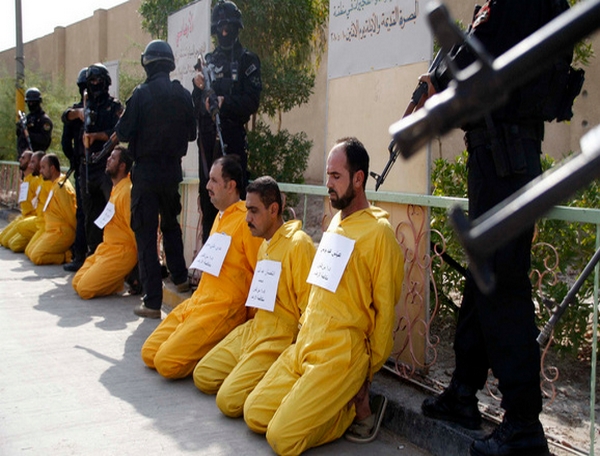 |
 |
||||
 |
 |
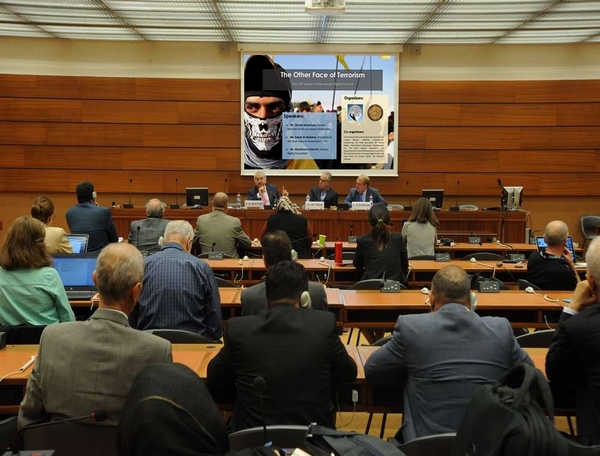 |
||||






